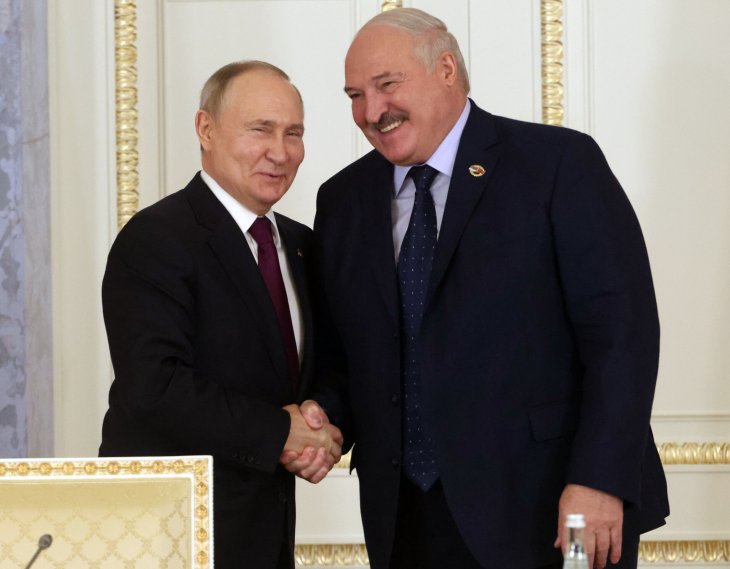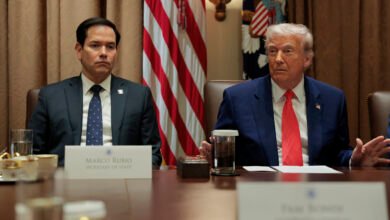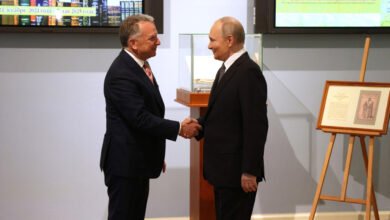Against all strategic rationale, Russian troops keep pushing Ukrainian defenses beyond Avdiivka and Bakhmut, paying a heavy price in casualties for every inch gained. The primary reason for these self-destructive attacks is to maintain the initiative necessary to prove Russia’s upper hand in the “long war.”

Putin finds it necessary to declare readiness to end the war, a point he mentioned last week at a meeting with Belarusian President and Putin ally Alyaksandr Lukashenka. Here are the two in St Petersburg in January. Photo: Contributor/Getty Images
This illusion of control gives Russian President Vladimir Putin the confidence to claim that all his original goals for the “special military operation” — amounting to the dismantling of Ukraine and innervation of the North Atlantic Treaty Organization (NATO) — will be achieved.
Simultaneously, he finds it necessary to declare readiness to end the war, a point he mentioned last week at a meeting with Belarusian President and Putin ally Alyaksandr Lukashenka (Kommersant, April 12). Increased international calls for peace talks have painted the Kremlin leader into a corner as Moscow seems unable to provide effective solutions for quelling domestic strife and achieving victory in Ukraine.
Putin’s lengthy reflections on the “nearly done” peace deal in March 2022 in Istanbul can barely camouflage his unalterable ultimatum that Ukraine can only end the war by capitulating (RBC.ru, April 11). He has been prompted to declare his readiness to resume talks due to the confirmation of a mid-June conference in Switzerland, where officials will discuss Ukrainian President Volodymyr Zelenskyy’s proposed peace plan (Rossiyskaya gazeta, April 12). Serious multilateral efforts have been invested in this event, which could yield more results than the three previous conferences in Malta, Jeddah, and Copenhagen (The Moscow Times, April 10). Moscow has good reasons to worry that stronger Western unity and broader support in the Global South will be achieved in Switzerland (see EDM, April 8) . As a result, Moscow has tried to argue that no agreement can be reached without its participation while asserting that it has no intention to partake in the conference (TASS, April 12; Izvestiya, April 13).
Türkiye’s involvement
One particular concern is Türkiye’s involvement in the conference (RIA-Novosti, April 11). Turkish President Recep Tayyip Erdogan harbors ambitions to become a key mediator and even peacemaker between Kyiv and Moscow. Zelenskyy’s visit to Istanbul last month sought to encourage these aspirations while promoting military-technical cooperation (NV.ua, April 12). The new edition of Erdogan’s peace initiative, released last week, is far from Zelenskyy’s formula. Still, Türkiye’s engagement with the Switzerland conference will be no small diplomatic victory for Ukraine (Novaya gazeta Europe, April 12). Putin’s visit to Türkiye has been postponed, according to the Kremlin, for the “foreseeable future.” Ankara’s recent preference for deepening ties with the United States and supporting a stronger role for NATO does not fit with Moscow’s hopes for cultivating a closer partnership (Interfax, April 8).
Beijing’s stance
The Kremlin seems more concerned with Beijing’s stance on ending the war. Russian Foreign Minister Sergei Lavrov visited Beijing last week to meet with his counterpart, Wang Yi, and Chinese Communist Party General Secretary Xi Jinping (RIAC, April 11). Lavrov found it much easier to issue a joint condemnation of NATO activity in the Asia-Pacific than to determine whether China would send a delegation to Switzerland—a challenge that did not prevent the Russian official from claiming that Zelenskyy’s formula and Beijing’s peace plan were incompatible (TASS, April 12). China continues to play a complex war-profiteering game, showing readiness to increase support for Russia while feigning compliance with the Western sanctions regime (Forbes.ru, March 21).
The Russian population
The lack of enthusiasm among the Russian population for the war effort has further upset Moscow. Unreliable as opinion polls in Russia are, recent polling shows that, in the 18–24 age group, only 22 percent support continuing combat operations; 59 percent prefer peace talks. Only half of the respondents in the 55+ age group agree with the Kremlin’s war-drumming propaganda (Levada.ru, April 4). Natural disasters, such as the catastrophic flooding in the Orenburg region, produce more public resentment against Moscow’s colossal expenditures on the war. Simultaneously, critical infrastructure, such as dams and bridges, remain significantly underfunded (The Moscow Times, April 9).
Putin has opted, as usual, to distance himself from bad news, focusing instead on the successful (though long-delayed) launch of the new Angara-A5 space rocket from the Vostochny Cosmodrome (Svoboda.org, April 12; see EDM, April 15). This achievement can hardly lift public spirits, however, particularly because Russia’s leadership in space has been reduced to Gagarin-era legends and Roscosmos’ new projects remain seriously underfunded (EDM, February 23; Nezavisimaya gazeta, April 11).
Mounting anti-war sentiments
Mounting anti-war sentiments in Russian society could encourage numerous military-age men to dodge the ongoing spring draft and desert the shrinking battalions in Ukraine exhausted by trench warfare (CurrentTime.tv, April 13). They also accentuate the political risks of a looming new wave of mobilization (The Insider, April 12). Plans for a new summer offensive demand a surge in manpower, but the Russian economy has already been slowed down considerably by acute labor shortages (Svoboda.org, April 9).
This limbo contrasts with Ukraine, which passed a new mobilization law last week (Re: Russia, April 8). The law is controversial, and passing it was rather difficult. Russian propaganda has tried to emphasize these facts as signs of Ukraine’s weakness (EDM, April 10). In reality, these disagreements demonstrate the resilience of democratic processes, even in wartime (Izvestiya, April 12).
A new anti-war driver appeared in Russia after the terrorist attack on Crocus City Hall, which highlighted the growing threat of Islamist extremism (Meduza, April 3). “Military-patriotic” pundits are eager to pursue the fake Ukrainian connection while demanding harsh measures against labor migrants from Central Asia (TopWar.ru, April 10). Putin’s reassurances that Russia cannot be a target of attacks by Islamist fundamentalists are hardly convincing, particularly as the Middle East has become engulfed by violence (RBC.ru, April 4). The Kremlin’s close military partnership with Iran has made it impossible for Moscow to utter a word of criticism against the attack on Israel on April 14, in which some 185 Shahed-136 loitering munitions (the same drones Russia uses against Ukraine) were shot down (RIA Novosti, April 14).
The Kremlin is losing
Putin may cherish the illusion that he is winning the long war against Ukraine. In reality, the Kremlin is losing as the traumatized Russian society faces ongoing degradation and international stakeholders increasingly come together with demands for ending hostilities. The peace plans and initiatives may diverge and differ in feasibility and legal integrity, but none is acceptable for Putin, who has pinned his corrupt regime’s survival to the perpetual war. The idea of peace, however, is gaining momentum that looks to eventually overcome the Kremlin leader’s warmaking folly.
Source link




